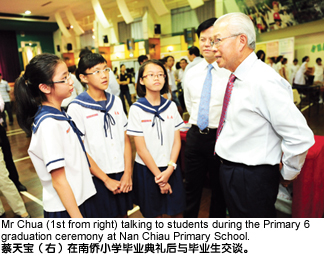
Promoting the cause of education and culture is the mission and goal set by the founding fathers of Singapore Hokkien Huay Kuan (SHHK). While holding steadfast to them throughout its 173-year history, SHHK has now given itself new benchmarks to meet.
Mr Chua Thian Poh, Chairman and Chief Executive Officer of the Ho Bee Group, is not only the President of SHHK but also the Chairman of the SHHK Affiliated Schools Management Committee. Needless to say, Mr Chua shoulders the heavy responsibility of spearheading the cause of education. Currently, SHHK has five affiliated primary schools: Tao Nan School, Ai Tong School, Chongfu School, Nan Chiau Primary School, Kong Hwa School; and only one affiliated secondary school: Nan Chiau High School.
Setting Up Two New Secondary Schools
During EduNation’s interview, Mr Chua shared his wish for the support of the Ministry of Education (MOE) to set up two affiliated secondary schools in the vicinity of SHHK’s affiliated primary schools to provide ten years of continuous education to its students.
“SHHK has only one secondary school. We are prepared to put in more resources and make our mark in secondary school education. As Nan Chiau High School is located in the northeast of Singapore, we hope to set up a secondary school in the east near Kong Hwa School and Tao Nan School; and another in central Singapore, near Chongfu School or Ai Tong School. This will meet the needs of parents who wish to send their children to SHHK affiliated schools and will benefit, in particular, students staying in the east and central parts of Singapore,” said Mr Chua, who hopes that the government will take into consideration SHHK’s passion and commitment to education and its century-old stellar track record in producing top students, and allow SHHK to set up two more secondary schools. Such a plan is an extension of SHHK’s commitment towards education and is also in line with the vision of its past leaders.
Businessmen’s Passion for Education
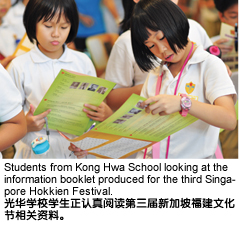 SHHK’s accomplishments in education date back centuries. The early 19th century saw a diaspora of Fujians travelling the South Seas to seek better lives for themselves. In 1840, the Fujians established SHHK. Beyond meeting the needs of new immigrants from Fujian, it established schools to preserve and promote Chinese language and culture. In 1849, it set up its education institution — Chong Wen Ker. Over the years, SHHK’s commitment and contribution to education have continued. SHHK’s accomplishments in education date back centuries. The early 19th century saw a diaspora of Fujians travelling the South Seas to seek better lives for themselves. In 1840, the Fujians established SHHK. Beyond meeting the needs of new immigrants from Fujian, it established schools to preserve and promote Chinese language and culture. In 1849, it set up its education institution — Chong Wen Ker. Over the years, SHHK’s commitment and contribution to education have continued.
“SHHK is a clan association. Our members come from all walks of life but are united through their common belief in the power of education. This belief in education has never wavered over the years. SHHK forefathers saw the value of education through the hardships they witnessed as society developed,” said Mr Chua.
“A successful businessman would be even more aware of the importance of education. Education lays the foundation of a person. A strong foundation allows one to think logically and methodically. One’s contribution to education can benefit many future generations. It is a long-term undertaking and requires generations to first till the land, sow the seeds and put in immense effort before one can harvest the fruits of labour.”
Building Character from Young
In line with its mission of preserving and promoting Chinese language and culture, SHHK is known for its efforts in character building and inculcating the right values. Mr Chua proclaimed confidently, “SHHK students possess a unique identity and quality. We put a lot of emphasis on character building and inculcate Asian values like courtesy and respect. These may seem cliché today but we hope that early exposure will empower our students to one day become sensible and civilised.” The common school motto for SHHK affiliated schools is Sincerity and Perseverance — words which bear witness to its commitment to building character.
One common feature of SHHK affiliated schools is its strategic emphasis on a bilingual and bicultural curriculum. From 2007, its five affiliated primary schools have conducted the Bi-Cultural Chinese Elective Programme (BiCEP) aimed at nurturing students to be bilingual and bicultural. To further this emphasis, SHHK is in the process of publishing a series of illustrated books depicting life stories of its pioneers as supplementary reading materials for the Character and Citizen Education Programme. The books are written by teachers of the five schools. The first book in the series depicting Mr Tan Kah Kee and his contributions to education was published in June. The colourful book targeted at Primary 4 students captures the attention of its young readers and extols the values that the late Mr Tan believed in.
Encouraging Every School to Find Its Niche
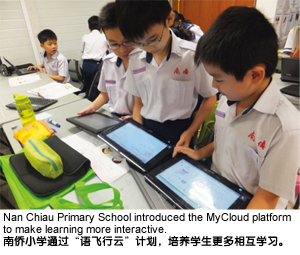 Mr Chua believes that education requires the interest and involvement of people from all walks of life. Everyone is unique and it is exchanges and exploration that create synergy and a dynamic society. Mr Chua believes that education requires the interest and involvement of people from all walks of life. Everyone is unique and it is exchanges and exploration that create synergy and a dynamic society.
Hence, SHHK also encourages its affiliated schools to develop their own niche.
In 2012, Nan Chiau High School was named the 11th Special Assistance Plan (SAP) School. This was a major vote of confidence to both SHHK and Nan Chiau High School. Since then, Nan Chiau High School has continued to develop its own niche so as to build a unique brand. Accordingly, SHHK contributed $2 million to upgrade the infrastructure of the School. The School has since developed a niche curriculum that is centred on modernity, practicality, humanity, diversity and creativity.
Synergy Amongst SHHK Affiliated Schools
Each of the five SHHK affiliated primary schools is unique. Although their uniqueness sets them apart from one another, SHHK is able to maximise economies of scale and build on their strengths. For instance, trial lessons for the BiCEP were first run in Tao Nan School before being implemented across all its affiliated primary schools. And in 2011, Nan Chiau Primary School was named by the MOE as a Future School. It focuses on incorporating technology in the classroom. Nan Chiau Primary School developed its MyCloud platform which integrates learning into everyday life. The programme will now be extended to the other four affiliated schools with funding from SHHK.
“We hope to see principals and teachers of our affiliated schools work together and the niche of one school being replicated in the other affiliated schools to benefit more students,” said Mr Chua, who believes that such platforms act as catalysts for the sharing of pedagogies and best practices.
Close Ties With Its Affiliated Schools
The development of its affiliated schools is a priority for SHHK. It sets aside $2 million annually to fund school operations. In addition, it requires schools to submit three- to five-year plans for special projects that require substantial funding. After appraising the effectiveness of each proposal, SHHK will then inject financial resources to fund them. SHHK not only supports its affiliated schools financially. The SHHK Affiliated School Management Committee meets the school leaders of each affiliated school at least six times a year. Such meet-ups facilitate a better understanding and ensure that timely support and assistance are provided.
Stalwart Financier and Staying Relevant
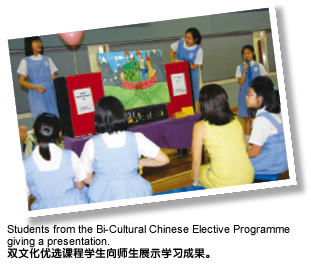 Mr Chua also stressed the importance of staying relevant with the times in today’s education landscape. SHHK aligns itself with government policies. Under the Programme for Rebuilding and IMproving Existing Schools (PRIME) and the Primary Education Review and Implementation (PERI), SHHK will fund $12 million in infrastructural improvements in its schools. Construction work is expected to be completed in 2015. Mr Chua also stressed the importance of staying relevant with the times in today’s education landscape. SHHK aligns itself with government policies. Under the Programme for Rebuilding and IMproving Existing Schools (PRIME) and the Primary Education Review and Implementation (PERI), SHHK will fund $12 million in infrastructural improvements in its schools. Construction work is expected to be completed in 2015.
In November 2011, SHHK also donated $1.5 million towards the Lee Kuan Yew Fund for Bilingualism when it was first launched.
SHHK’s contribution towards education has gone beyond primary and secondary school education. In early 2012, it donated $3 million to the Singapore University of Technology and Design to fund a professorship and bursaries to nurture technology savvy and creative leaders.
Service to All — Setting Up of the SHHK Cultural Academy and Pre-school
SHHK established its popular Arts & Cultural Troupe in 1986 to promote Chinese arts and culture. Last year, with the support of the government, it announced the setting up of the SHHK Cultural Academy, located at the former site of Chai Chee Secondary School along Upper East Coast Road. The new Academy will cater to students of all ages, and offer a range of programmes from pre-school to adult. It intends to tie up with both local and overseas tertiary institutions to develop and run adult certificate courses.
“This $20 million project serves as an extension of SHHK’s mission to preserve and promote Chinese language and culture beyond its current scope,” elaborated Mr Chua.
Sited within the Academy will be a pre-school that caters to three- to six-year-olds. Its unique approach will consist in creating a home-away-from-home environment whilst focussing on a holistic approach towards learning. The curriculum will be value-centric and aims to make learning inspirational and fun. It will also provide a care programme to meet the demands of working parents.
Mr Chua hopes that the pre-school will allow young children to be exposed to Chinese language and culture at an early age in order to prepare them to embrace Chinese language and culture as they grow up. He shared his hope that the pre-school will reach out to more English-speaking families so that they too may experience the richness of the Chinese language and culture.
Valuing Teacher Training, Grooming Excellent Teachers
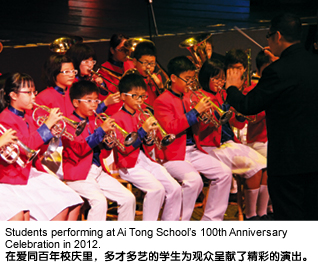 Teachers are central to education, and SHHK invests a great deal to train teachers. SHHK awards scholarships annually to its teachers to further their studies. “The most important component in education is the teacher. It takes dedicated teachers to groom exceptional students,” said Mr Chua. Teachers are central to education, and SHHK invests a great deal to train teachers. SHHK awards scholarships annually to its teachers to further their studies. “The most important component in education is the teacher. It takes dedicated teachers to groom exceptional students,” said Mr Chua.
Therefore, SHHK sponsors 12 to 15 teachers to further their studies every year. “These are bond-free scholarships. Other students will benefit even if these teachers do not remain in service in SHHK affiliated schools. SHHK is more than happy to do its part for education.”
In 2012, SHHK established the LEAP Award to recognise remarkable teachers who have made a difference in the lives of their students. Recipients receive an award and a $1,000 cash prize. “We value outstanding teachers not only from mainstream primary and secondary schools but from special schools as well. We need to recognise and acknowledge their contributions,” explained Mr Chua.
Challenges in Pursuit of Education Excellence
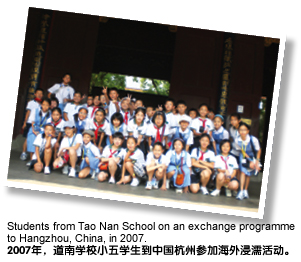 Education is a long-term investment, and requires many generations to persevere in order to sustain it. It is therefore vital for SHHK to attract a new generation willing to contribute and carry the baton. Education is a long-term investment, and requires many generations to persevere in order to sustain it. It is therefore vital for SHHK to attract a new generation willing to contribute and carry the baton.
Between the 1940s and 1960s, the larger community participated actively in the development of education. In the 1970s, the government shouldered the responsibility of developing schools and the education sector. This led to a diminished role for the community. Organisations like clan associations may no longer be directly involved in education but some have continued to support it by giving out bursaries and scholarships. Mr Chua lamented that the younger generation today feel that education should be the sole responsibility of the government and feels that they are generally ignorant of the community’s participation and contributions in school management, infrastructure development, value-added curriculum and programmes, and teacher training. Hence, there is a need for SHHK to create platforms to enhance such awareness.
Over the last few years, SHHK has arranged for all its affiliated school students to visit the association and the Thian Hock Keng Temple, one of the oldest and most important Hokkien temples in Singapore, as part of national education and to orientate students to the SHHK family.
As Chairman of the Singapore Federation of Chinese Clan Associations, Mr Chua also urges other clan associations to attract new blood into their fold so as to ensure that clan associations are able to keep their legacy and values alive. He hopes that cooperation between schools and clans will further enhance SHHK’s contributions in education and nation building.
Mr Chua also spoke on the rise of the number of parents joining alumni associations in recent years. He welcomed this spirit of involvement but cautioned against parents joining such associations just to secure a place in school for their child. They should genuinely wish to do their part for the schools. Mr Chua’s involvement with SHHK is a perfect example of this. He received no special treatment when his grandson registered for Primary 1. He was also subjected to the same queue and balloting process. It is clear that Mr Chua believes in setting an example.
When asked about the recent debate on priority for alumni in the Primary 1 registration exercise and the concern that it encourages a closed intake, Mr Chua called for a review of the system. He said, “I think the approach should be based on equitable opportunity. For Phase 1 which is opened to siblings of existing students, many support retaining this phase as it bonds siblings. For Phase 2A, 2B and 2C, SHHK proposes that the MOE re-calibrates the existing formula. We propose that Phase 2A and 2B be extended to children of active members, alumni, parent volunteers and grassroots leaders. This will further encourage proactive service to schools and the community.”
Doing More to Benefit MoreK
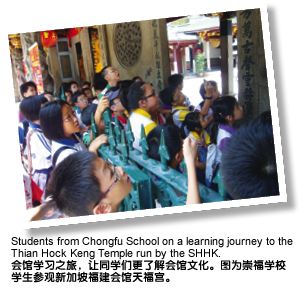 Mr Chua has devoted significant time and money to the community and education. In particular, he has made generous donations to tertiary education in recent years. Mr Chua has devoted significant time and money to the community and education. In particular, he has made generous donations to tertiary education in recent years.
In 2008, the Ho Bee Group, founded by Mr Chua, sponsored a $3 million Ho Bee Professorship in Chinese Economy and Business at the Singapore Management University. Its aim is to encourage research on China and its economy in order to equip Singaporeans with a better understanding of the world’s second largest economy.
In November of the same year, Mr Chua donated $5 million to the Nanyang Technological University to establish a Chua Thian Poh Entrepreneurship Education Fund aimed at encouraging entrepreneurship amongst its students.
And in November 2011, he donated another $5 million to the National University of Singapore to set up the Chua Thian Poh Community Leadership Programme to encourage more students to become community leaders and give back to society. In the same year, Mr Chua donated $1 million in support of the Lee Kuan Yew Fund for Bilingualism.
“If I spend money on myself, it can only affect my own life. But if money can be put to better use, it will benefit more people. That is what I aspire to do,” said Mr Chua.
|